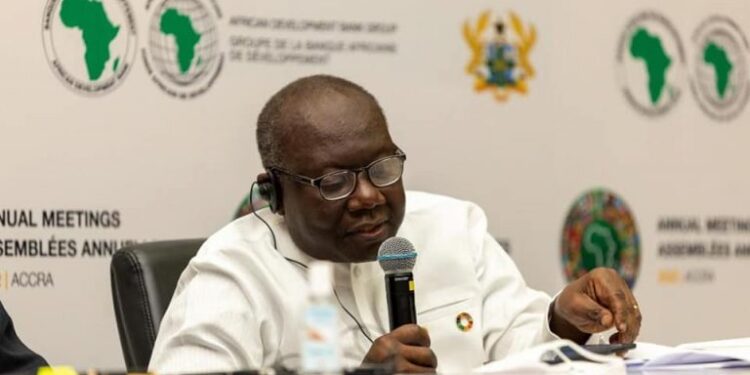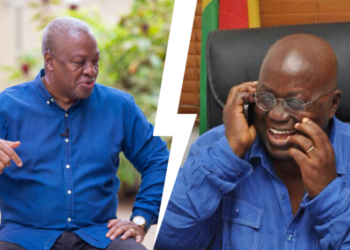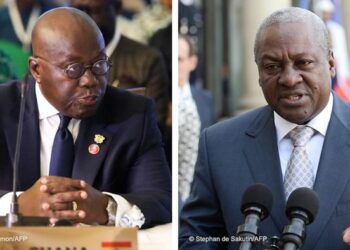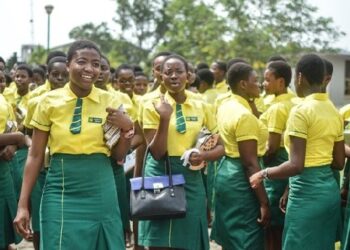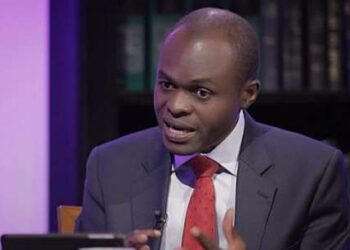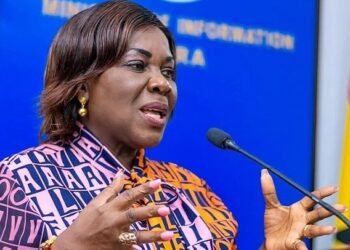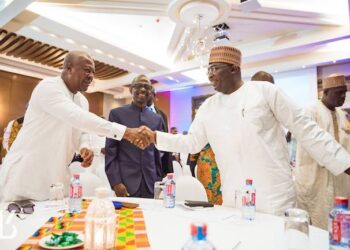On Friday, November 18, 2022, the Minister of Finance, Ken Ofori-Atta (KOA), was before a parliamentary committee to give responses to all issues raised as grounds for which the Minority in Parliament (MIP) had employed a motion of censure against him to cause his removal from office. We reproduce the detailed responses rendered to the House below. The first part was produced last Saturday.
iii. We have recruited over 200,000 Ghanaians into crucial service areas such as education, health, security and local government; and
iv. Established a Tree Crop Development Authority with a focus on mango, cashew, rubber, oil palm, shea and coconut in order to diversify our economy and provide raw materials for industrialisation.
These and many more we have done.
MIP: Issue of fiscal recklessness and depreciating cedi
KOA: Hon. co-chairs, the idea that the depreciation of the cedi is the result of fiscal recklessness is not supported by the available facts.
The Ghana Cedi consistently performed very well throughout my tenure as Finance Minister up until March 2022. The records show that between 2012 and 2016, the cedi depreciated by an average of 17 per cent, whilst between 2017 and 2021, the average rate of depreciation was seven per cent.
The major contributors to the currency problem are not necessarily fiscal factors. Hon. co-chairs, unlike July 2014 when the cedi was last rated as the world’s worst performing currency, the 2022 depreciation is largely attributed to extraordinary global factors, including the strengthening of the US Dollar (even against major international currencies such as the UK Pound and the Euro); and speculation due to economic uncertainties. For example, in this year 2022, the euro is worth less than the dollar for the first time in 20 years.
As stipulated in Article 183 of the Constitution, Section 2(a), “The Bank of Ghana shall promote and maintain the stability of the currency of Ghana and direct and regulate the currency system in the interest of the economic progress of Ghana.” As such, the Bank of Ghana, which manages our reserves, is leading the interventions to contain the depreciation of the cedi.
Government, on its part, is undertaking real sector interventions through initiatives such as 1D1F and the Ghana CARES programme to accelerate the import substitution of products such as poultry and rice and promote an export-led economy, thereby reducing foreign exchange pressures from the imports of those products.
We intend to announce additional measures to promote the consumption of local produce. Furthermore, the implementation of the AfCFTA positions Ghana as a continental trade hub, and we shall take advantage and boost the export orientation of our industries.
The Ministry of Finance has also arranged significant financing, including the US$750 million from Afrexim Bank to support the 2022 Budget and boost our foreign exchange reserves. This forex inflow has improved the supply of foreign currency and boosted the stability of the local currency. We continue to explore avenues to secure additional financing to boost the reserve position.
MIP: “Alarming incompetence and frightening ineptitude resulting in the collapse of the Ghanaian economy and an excruciating cost of living crisis.”
KOA: Hon. co-chairs, this is very strong language. The choice of words for this part of the motion is worrying, especially as it relates to the functioning of the whole national economy. The truth is, considerable progress has been made under my tenure as Minister of Finance.
Hon. co-chairs, we have competently managed the economy since 2017. Indeed, to appreciate where we are now, we need to look back at where we came from. At the close of 2016, an assessment of the economy revealed:
i. Limited fiscal space (fiscal deficit – 6.5 per cent);
ii. A distressed financial sector (NPL ratio – 17.3 per cent);
iii. An asset quality review document which had not been released;
iv. A derailed IMF-ECF programme and reduced economic output (GDP growth – 3.4 per cent);
v. Inflation was 15.4 per cent at the end of 2016;
vi. Monetary Policy Rate (interest rate) was 25.5 per cent at the end of December 2016;
vii. Limited CAPEX to MDAs; and
viii. ‘Dumsor’ which had decimated local industry and strongly impeded national productivity.
Hon. co-chairs, it is important to note that through our leadership and commitment to turn around the economy from its state in 2016, we made great strides and remarkable progress in the years before the pandemic and the records attest to this.
The headline facts are:
i. We doubled economic growth in our first three years and Ghana’s growth in 2019 was touted as one of the highest globally;
ii. Inflation came down significantly from 15.4 per cent to 7.9 per cent at the end of 2019 and remained in single digits till the pandemic hit in March 2020;
iii. The fiscal deficit which was about 6.5 per cent was brought down to under five per cent by the end of 2019;
iv. Exchange rate depreciation reduced significantly to under five per cent in 2017 and averaging 8.7 per cent between 2017 and 2019;
v. We reduced interest rates in line with declining inflation expectations. Monetary Policy Rate declined from 25.5 per cent at the end of December 2016 to 16 per cent at the end of 2019 while the average lending rate for the same period declined from 31.70 per cent to 23.7 per cent;
vi. The government directly spent GH¢25 billion to save the banking and SDI sector, protecting the near collapse of the financial sector; saving close to 5,400 direct jobs and 12,000 indirect jobs; making sure 4.6 million depositors were protected; and
vii. Government also implemented comprehensive reforms across the energy sector and kept the lights on to date.
On the back of good economic management, in April 2019, Ghana successfully completed and exited the IMF-ECF programme that we inherited. To ensure irreversibility of the macroeconomic gains, government introduced a number of measures, including:
i. Passage of the Fiscal Responsibility Act, 2018 (Act 982) to cap the fiscal deficit at five per cent of GDP and ensure maintenance of positive primary balance;
ii. Passage of the Public Financial Management Regulations, 2019 (LI 2378) to strengthen regulation of the Public Financial Management System; and
iii. Establishment of the two Social Partnership Programmes with labour and faith-based organisations.
Clearly, there was strong momentum and optimism towards the Ghana Beyond Aid agenda at the end of 2019.
However, with the onset of the pandemic, the gains from over three years of fiscal rectitude were reversed as a result of efforts to ensure lives and livelihoods were protected.
Ultimately, these considerations informed the raft of revenue and expenditure measures outlined in the 2022 Budget Statement.
We laid out the 2022 Budget to achieve fiscal consolidation anchored on debt sustainability. It is important at this point to also highlight a key component of the national debt stock related to three exceptional expenditure items that are neither external nor a creation of this government:
i. Energy sector excess capacity payments (GH¢ 17 billion), which relate to a legacy of take or pay contracts that saddled the country’s economy with annual excess capacity charges of close to US$1 billion;
ii. Direct COVID-19 expenditure amounted to GH¢ 12.0 billion; and
iii. The banking sector cleanup (GH¢ 25 billion).
These three items alone contribute to about 23 per cent of our annual debt servicing cost. These three items were not created through the recklessness of the New Patriotic Party. The long dumsor that Ghanaians endured under the NDC administration between 2012 and 2016 was more to do with the NDC government’s inability to pay for power.
So co-chairs, I find it curious that Mr Ato Forson will choose to cite energy bills as an example of the recklessness that the Minority charges me with and seek my removal by censure, especially when we have had to pay around $500 million dollars a year in excess capacity charges for power the previous administration negotiated that we do not need and we do not use.
Hon. co-chairs, in actual fact, we have been able to renegotiate some of these power purchase agreements and the new agreements with the Priority IPPs, once finalised and executed, will offer estimated nominal savings of more than US$4 billion over the next five years.
We have also used a significant part of the borrowing to undertake key transformative investments such as:
i. The fixing and constructing of over 11,500 kilometres of new roads between 2017 and 2021;
ii. The construction of 12 major interchanges since 2017 as compared to five interchanges in the previous eight years.
iii. The construction of the Eastern Regional and Central Gonja hospitals;
iv. Commencing work on 87 of the Agenda 111 projects;
v. Funding ongoing airport projects, including the Kumasi International Airport; and
vi. Promoting the establishment of the Development Bank Ghana to provide competitive finance for Ghanaian entrepreneurs.
Indeed, the e-levy was born out of this heightened need to mobilise resources sufficient for managing the pre-eminent challenges of our time: fiscal consolidation, debt sustainability and reducing youth unemployment.
Unfortunately, the delay in the passage of the e-levy adversely impacted market confidence and largely contributed to the downgrade in Ghana’s sovereign credit ratings in January 2022, and these resulted in a whole deterioration of the financial conditions for Ghana and closed Ghana’s access to the International Capital Markets (ICM) due to deteriorated perception and loss of confidence by investors.
For this reason, access to ICM funds was no longer available, which resulted in a severe BOP problem that needs to be addressed.
The government, thus, resorted to the IMF as a lender of last resort to not only address the immediate and active BOP need, but also to protect all the macro and social policy gains made in the last five years.
Undoubtedly, the last few months have seen considerable economic uncertainty and challenges. These have been characterised by high inflation levels and rapid depreciation of the cedi. Indeed, the economic challenges we are facing require deliberate but urgent, well-thought-out strategic steps, as well as the support of the Ghanaian people.
The above notwithstanding, there are still some bright spots.
Overall, our growth outturn of 3.4 per cent and 4.8 per cent in Q1 and Q2 2022 respectively, coupled with modest improvements in our fiscal position, suggests our economy is gradually on the upswing despite the numerous shocks we have faced over the past two years.
This progress gives us a solid foundation to confront the challenges in front of us.
Undoubtedly, risks remain that we are highly attuned to; however, the Ministry of Finance is committed to working alongside all stakeholders, including the members of Parliament to ensure we can reposition our economy back on a path of growth and prosperity.
MIP: “Gross mismanagement of the Ghanaian economy, which has occasioned untold and unprecedented hardship.”
KOA: Hon. co-chairs, the current economic challenges we are experiencing in Ghana are not the outcome of mismanagement, but we acknowledge the hardship our people are going through in these difficult times.
This assessment is wholly shared by objective observers. In the recent words of the Managing Director of the International Monetary Fund (IMF), Kristalina Georgieva, and I quote: “To the people of Ghana, like everybody else on this planet, you have been hurt by exogenous shocks. First the pandemic, then Russia’s war in Ukraine, and what we need to realise is not because of bad policies in the country but because of these combination of shocks…”
I have already discussed the domestic triggers behind the depreciating cedi. We simply cannot overlook the significant impact of the delayed passage of the revenue measures outlined in the 2022 Budget, which resulted in negative market reactions, credit rating downgrades, the narrowing of financing sources and the eventual depreciation of the cedi. The timelines are obvious and cannot be ignored.
Going forward
Hon. co-chairs, it is time to have an honest national conversation on the patterns of expenditure as a people. Our preference for imported goods, which requires foreign exchange that we do not earn enough of, implies that our cedi will continue to be under pressure.
It has become clear that we cannot continue in a business-as-usual mode. We have to significantly change our consumption patterns and support investments in local capacity for production and export.
Hon. co-chairs, even in these challenging times, we have not been rudderless. We have prepared the Post-COVID-19 Programme for Economic Growth (PC-PEG) as the domestic blueprint which has benefitted from input from all key stakeholders, including civil society organisations (CSOs), social partners (labour unions, employers and FBOs), academia, industry professionals and the leadership of Parliament.
This document contains a set of time-bound structural reforms and fiscal consolidation measures to place our debt levels and fiscal accounts on a sustainable path over the medium term, and has underpinned government’s engagement with the IMF.
The negotiation with the IMF is progressing steadily and well and we are working assiduously to achieve a Staff-Level Agreement (SLA) by the end of December 2022.
As the President announced recently, government is aggressively pursuing initiatives that will structurally boost the export orientation of this economy. In the coming 2023 Budget, and following consultations with key stakeholders, including AGI, Labour and the trading community, we expect to announce critical measures in this regard. This will complement the ongoing private sector-led interventions being promoted under the 1D1F and the GhanaCARES programme.
However, the world had no playbook to help us tackle the COVID-19 pandemic. Parts of the Ghanaian economy were shut down, including hotels, restaurants and events. Our efforts were further destabilised by the disturbances in the global supply chain.
But even in those times, we provided electricity and water free, grants and loans to businesses in the formal and informal sectors. We also paid our workers even when some were home for nine months and did not lay off anyone.
No country has been saved from the disruptions in supply chains, record hikes in prices of energy, food and commodities. Every economy is facing macro-fiscal challenges, rises in public debt levels and narrowing fiscal space.
Our situation was not helped by a combination of historic weaknesses in the structure of our import-dependent economy and our low capacity, even as compared to our neighbours, in raising domestic revenues. The 2023 Budget will contain policies directly aimed at tackling these vulnerabilities.
Hon. co-chairs, I am aware of the enormity of the challenges we face. I am aware that lives and livelihoods need to be protected. We have a well-consulted plan and the commitment to address this economic challenge. The Ministry of Finance and I have been working so hard 24/7 to quickly restore market confidence and ensure economic growth. We are nearly through with the IMF negotiations.
I am confident that once we conclude our debt sustainability programme and secure a fund programme, the nation will next year see the stability and fiscal space that can spur us back on to a sustainable economic recovery and growth, which should endure considering the investments we have made in all sectors.
Concluding remarks
Co-chairs, as a child, I was taught a hymn that has guided me throughout my life:
“Land of our birth, we pledge to thee our love and toil in the years to be, when we are grown and take our place as men and women with our race.
“Land of our birth, our faith, our pride, for whose dear sake our fathers died;
“O Motherland, we pledge to thee head, heart and hand through the years to be.”
Inspired by the words of this hymn, Hon. co-chairs, when I assumed the position of Minister of Finance, I resolved to serve the people of Ghana with my all.
Under my tenure as Minister of Finance, I have overseen some great strides in the development of Ghana and the improvement of the lives of the Ghanaian people.
As a nation, we are being tested. Our circumstances require a united and concerted response to the crisis. I implore our chiefs, elders and churches to take the mantle and speak a common language.
Let us all work as one country to support labour negotiations, find a solution to the impasse in Parliament and rise above witch-hunting and entrapment. These are not ennobling and progressive for a society seeking transformation.
Hon. co-chairs, Ghana is a resilient country. Ghana has faced economic challenges since independence. Ghana has always come through each of them stronger and better than before. God willing, we shall come out of these difficult times too. Ghana will, and must, rise again!!
Thank you, co-chairs. God bless.
SEND A STORY: Do you have a story for us or need a promotion / advertisement? Submit them via our email dannyboy744@gmail.com and via on +233 266777777

